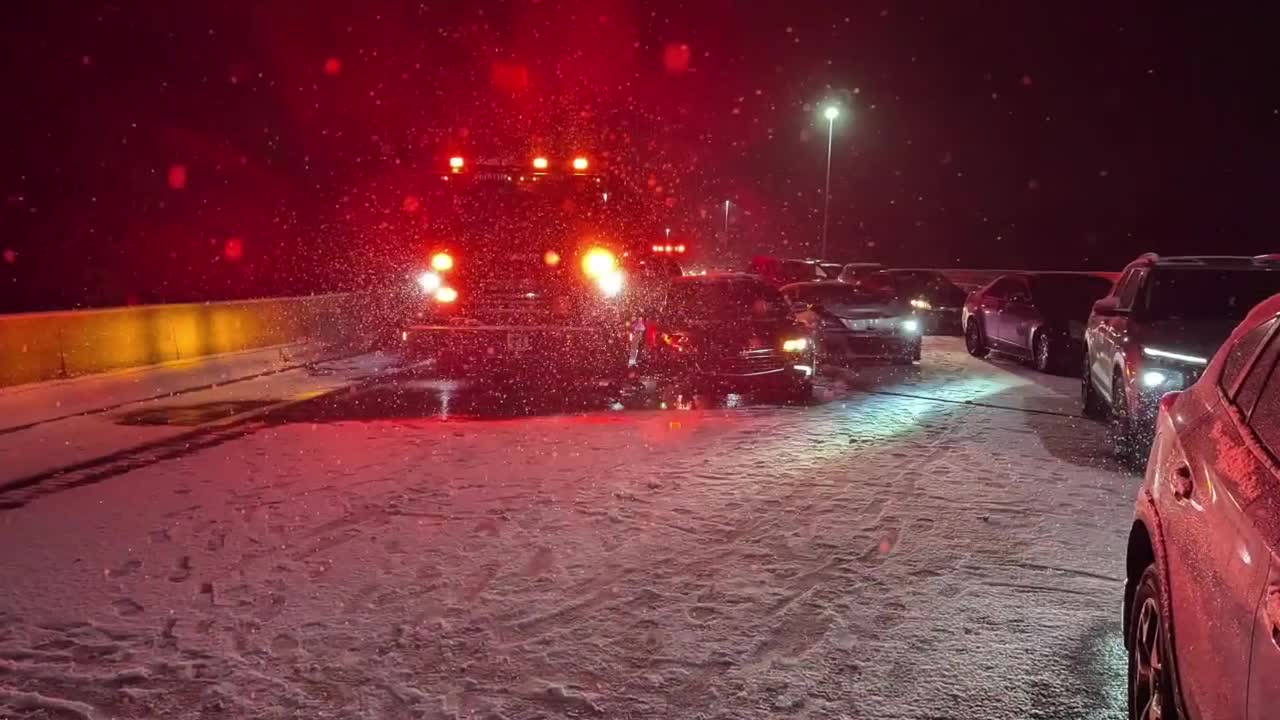WALKER, Mich. — We've all heard the advice: driving in snow, go slow. But what happens after you've already crashed? Walker Fire Chief Russell Shoultz has some critical advice that could save your life.
"When people get into a crash, the first thing that happens is a little bit of panic, a little bit of excitement," Shoultz explained. "The first thing you need to do is calm down. Make sure that you're okay and calm down."
But here's the part that goes against every driver's instinct: don't immediately jump out of your car.
"Jumping out of the car at any time on a busy street is very dangerous," the chief said. "It's amplified untold amounts when there's ice, water, anything on the roadways."
Shoultz's message is simple but potentially life-saving: if you don't know whether you should get out of your car, stay put. You're safer inside your vehicle than walking around after a crash.
"The other drivers aren't involved. They're going to be looking at the crash, not at the roadway," he said. "Most of the times, other drivers are looking at your car, not at you."
This advice applies even when you need to exchange insurance information with another driver. If both cars are drivable, move them off the roadway to a parking lot or safe space. But if your car won't move, especially on a freeway, stay inside.
"If you're on a freeway, you're in a crash, you cannot move your car ... stay in your car as long as you feel like it's safe to do so," Shoultz advised. "Get your flashers on, anything that you can do to make the car more visible, but when you get out of the car, you lose any and all protection against other traffic."
Even if you see other drivers already on their phones, call 911 yourself if you're involved in a crash.
"The more information, the better," Shoultz said. "You may not be hurt. Maybe the other driver is, maybe you're hurt, but the other driver isn't. So the more information we get to 911, the better we can do to get the right resources to the scene."
Fire units are often first on scene because they're dispatched immediately and have large vehicles that can help block roadways to protect other responders.
If you witness a crash, your first instinct might be to help — but Shoultz urges caution, especially in bad weather.
"Call 911, make sure that emergency services is on the way. Give a great description of what happened," he said. "But when you stop your car without the appropriate warning lights, without the appropriate reflective safety equipment, you can easily become a victim of that same crash, of secondary crashes."
The chief has seen this tragedy firsthand. Years ago, he responded to crashes where good Samaritans were injured or killed. Just a couple of years ago, he went to one where a young man got out of his car to help and was run over by another motorist.
"People tend to look at the wrecks. They're not looking for people," he said. "Especially if you don't have the right reflective gear on, you don't have flashing lights in your vehicle, it just makes it very unsafe."
Shoultz emphasized that successful emergency response requires teamwork — not just between agencies, but with the public.
"Call 911, give a good description of what happened, and let's all work together as a team to get through these inclement weather times together."
The bottom line: fighting the urge to immediately get out and help might be the most helpful thing you can do.
Be prepared with emergency supplies in your vehicle. Michigan State Police has a comprehensive web page to cover that.
Here's their list:
- Create a Winter Emergency Bucket. A 5-gallon pail (find one at your hardware store) filled with these emergency items could save your life:
- Long-burning candles (find in camping supply section of store)
- Lighter and waterproof matches
- Cell phone cord and power bank
- Space blanket (Mylar)
- Medication
- Flashlight, batteries and glow stick
- Hand warmer packets
- Toilet paper
- High-calorie food: nuts, granola bars, dried fruit, hard candy, etc.
- Extra mittens, hat and socks
- Coffee can (see sidebar)
- Other helpful items to keep in your car:
- Auto Emergency Kit (jumper cables, reflective triangles or road flares, jack and lug wrench to change a tire, small fire extinguisher in case of a car fire). Keep this in your car all year long.
- Winter boots
- Blankets and/or sleeping bags
- Shovel
- Bag of sand or kitty litter for traction under tires
- First aid kit (bandages, tape, gauze, antiseptic wipes, antiseptic cream)
- Multi-tool or small toolkit
- Radio (battery or hand-cranked power)
Do you have a story idea in Walker, Northview, or Comstock Park? Email robb.westaby@fox17online.com
This story was initially reported by a journalist and has been converted to this platform with the assistance of AI. Our editorial team verifies all reporting on all platforms for fairness and accuracy.





